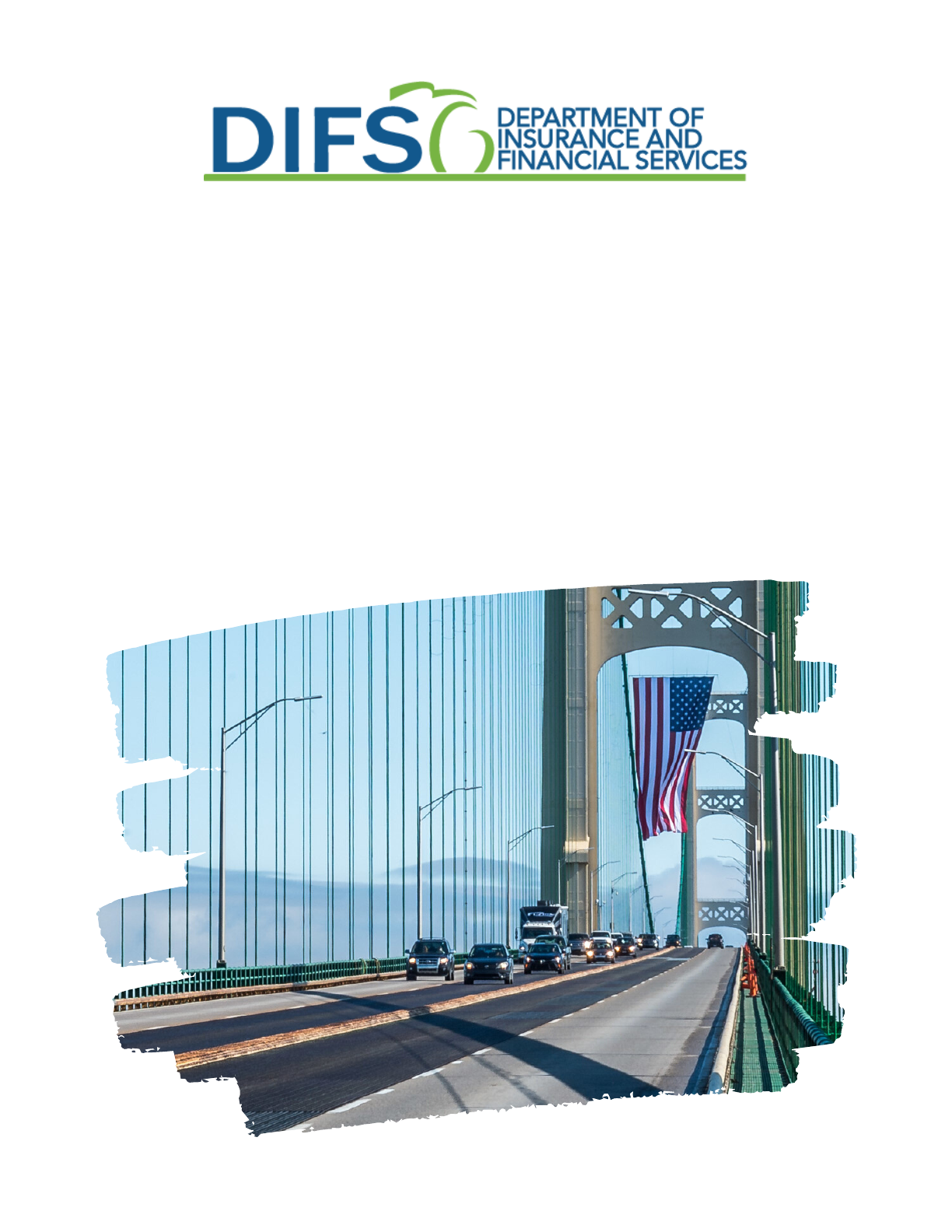
Michigan’s Auto Insurance Law Has Changed
The information contained in the following publication pertains to auto
insurance policies issued on or before July 1, 2020. Publications about auto
insurance policies issued on or after July 2, 2020 are available at
michigan.gov/autoinsurance.
For more information about the new auto insurance law and how it will affect
you, please visit: www.michigan.gov/AutoInsurance.

Consumer Counselor
Insurance Information for Michigan Consumers
[FIS-PUB 0202] Michigan Department of Insurance and Financial Services | 877-999-6442 | www.Michigan.gov/DIFS [10/19]
Brief Explanation of Michigan No-Fault Insurance
NO-FAULT INSURANCE is required by law in
Michigan. Every owner of a car must buy certain
basic coverages in order to get license plates. It
is against the law to drive or let your car be driven
without no-fault insurance.
If you have an auto accident, no-fault insurance
pays for your medical expenses, wage loss
benefits, replacement services, and the damage
you do to other people’s property. It does not
matter who caused the accident.
Your basic no-fault insurance does NOT pay for
repairs to your car. For an explanation of
insurance coverages providing protection for your
car, see the next page of this sheet.
The Basic No-Fault Policy You Must Buy Has
Three Parts:
1. Personal Injury Protection (PIP)
If you are hurt in an auto accident, this part of
your no-fault policy will pay all reasonably
necessary medical expenses with no
maximum limit. It will also pay up to 85% of
the income you would have earned if you had
not been hurt, for up to three years.
However, the amount that you would be paid
for lost income is limited and the limit is
revised annually. Please call DIFS at 877-
999-6442 for current wage loss amounts. In
addition, you are entitled to “up to” $20 per
day in replacement services. This is to pay
for routine household services which injured
persons are no longer able to provide for
themselves or their families, such as
housekeeping and yard work.
2. Property Protection (PPI)
No-fault will pay up to $1 million for damage
your car does in Michigan to other people’s
property, such as buildings and fences. It will
also pay for damage your car does to another
person’s properly parked vehicle. It does not
pay for any other damage to cars.
3. Residual Liability Insurance - Bodily Injury
and Property Damage
The no-fault law protects insured persons
from being sued as a result of an auto
accident except in certain special situations.
In general, you can only be sued:
(a) if you cause an accident in Michigan in which
someone is killed, seriously injured, or
permanently disfigured;
(b) if you are involved in an accident in Michigan
with a non-resident who is an occupant of a
motor vehicle not registered in Michigan;
(c) if you are involved in an accident in another
state; or
(d) for up to $1,000 if you are 50% or more at
fault in an accident which causes damages to
another person’s car which are not covered
by insurance.
Your required minimum coverage no-fault policy
will pay up to certain amounts if you are found
legally responsible. Although you may purchase
additional coverage with higher limits, the
minimum coverage offers:
Up to $20,000 for a person who is hurt or
killed in an accident.
Up to $40,000 for each accident if several
people are hurt or killed.
Up to $10,000 for property damage in another
state.
Increased Limits
You may be sued because of an accident, as was
discussed in the section on residual liability
insurance. If this happens, your no-fault policy
will pay up to the amounts shown in the residual
liability section.

[FIS-PUB 0202] Michigan Department of Insurance and Financial Services | 877-999-6442 | www.Michigan.gov/DIFS [10/19]
However, courts sometimes award more than
these amounts. If this happens, you would be
responsible for paying the amount not covered by
your insurance policy. To protect themselves,
many people buy higher limits of liability
insurance.
A No-Fault Policy Covers the Whole Family
A no-fault policy covers all family members living
in the same house. Personal injury protection
benefits will be paid even when a family member
is a passenger in another person’s car or is a
pedestrian when an accident takes place. The
personal injury protection coverage of your no-
fault policy also covers anyone who does not
have a no-fault policy and is hurt as a passenger
or pedestrian in an accident involving your car. It
will also cover a motorcyclist who is hurt in an
accident involving your car.
This is only a brief summary of no-fault insurance.
Some of the details have been left out. For more
information read your policy, talk to your agent, or
contact the Department of Insurance and
Financial Services (DIFS) for any additional
publications on this topic.
Insurance You May Want to Buy:
There are several types of coverage that you can
choose to buy in addition to the required no-fault
insurance. Three of the most common types of
extra insurance are described on this page.
1. Collision and Comprehensive Insurance
Your no-fault insurance DOES NOT pay for
repairs to your car if it is damaged in an
accident. If your car is properly parked and
hit by another car, the other driver’s no-fault
coverage will pay for the damage to your car.
Except for this one situation, the only kinds of
auto insurance that will pay for repairs to your
car are collision and comprehensive
coverage.
a. Collision coverage pays for repairs to your
car when it is damaged in a crash. There
are three basic kinds of collision insurance
to choose from: limited, standard and
broad form. The chart on the next page
describes each type and what it covers.
The deductible mentioned in the chart is
the amount of money you agree to pay
toward the cost of repairs before the
insurance company steps in and pays the
remainder. The larger the deductible, the
lower the cost of your collision insurance.
b. Comprehensive insurance pays for your
car if it is stolen or for repairs if it is hit by
a falling object, collides with an animal, or
is damaged in a fire, flood or by vandals.
If you have an older car, you may not want
collision and comprehensive coverage. If
your car is financed, the company that loans
you the money may require that you buy
collision and comprehensive coverage.
2. Limited Property Damage Liability
Insurance - “Mini-Tort”
Most companies offer coverage for the $1,000
liability mentioned in (d) in the section on
residual liability insurance.
3. Towing and Rental Car Coverage
Towing and Rental Car Coverage is an
optional coverage available from most
insurance companies as an additional
coverage on an automobile insurance policy.
This coverage generally covers or reimburses
the cost of towing and/or a rental car for
covered events (accident, breakdown, flat tire,
etc.). The cost is usually small in relation to
the total policy premium.
Alternatively, many insurance agencies offer
memberships into clubs that offer these types of
benefits to their members. These clubs generally
offer limited reimbursement for the same types of
events. The memberships may also offer
additional benefits, and the membership fees vary
greatly. You should ask your agent how much the
membership costs, how the product works, and
what other benefits are available with the
membership to determine if the product is right for
you.

[FIS-PUB 0202] Michigan Department of Insurance and Financial Services | 877-999-6442 | www.Michigan.gov/DIFS [10/19]
What to Do if You Have a Question or a
Problem:
If you have an insurance question or problem, call
your insurance agent or company. If your
questions are not answered, contact DIFS at the
address or telephone number below. DIFS is the
state department that regulates insurance in
Michigan.
About DIFS
The mission of the Michigan Department of
Insurance and Financial Services is to ensure
access to safe and secure insurance and
financial services fundamental for the opportunity,
security and success of Michigan residents, while
fostering economic growth and sustainability in
both industries. In addition, the Department
provides consumer protection, outreach, and
financial literacy and education services to
Michigan citizens. For more information please
contact DIFS at 877-999-6442 or visit
www.michigan.gov/DIFS.

[FIS-PUB 0202] Michigan Department of Insurance and Financial Services | 877-999-6442 | www.Michigan.gov/DIFS [10/19]
The Three Types of Collision Coverage
Michigan law requires you to have no-fault automobile insurance on your car. If you have an accident, this
required insurance pays for injuries to people and for damages your car does to other people’s property
and to properly parked cars. IT DOES NOT PAY FOR ANY OTHER DAMAGE TO CARS. You must buy
collision coverage if you want coverage for damage to your car in case of accident. The other
driver’s insurance will not pay for damage to your car.
There are three kinds of collision insurance you can choose from: limited, standard, and broad form. The
chart tells you when each kind of insurance will pay YOU if your car is damaged in an accident. Your collision
coverage will not cover damage to the other driver’s car.
REMEMBER, you are not required by law to have collision insurance, BUT YOU MUST HAVE COLLISION
INSURANCE IF YOU WANT INSURANCE TO PAY FOR DAMAGES TO YOUR CAR RESULTING FROM
AN ACCIDENT.
If your vehicle is damaged
in an accident and you
have this kind of collision
coverage.
Nature of Accident
You are MORE THAN 50%
at fault (you hit a tree, a
person, another vehicle,
etc.)
You are 50% OR LESS at
fault (you are rear-ended,
side-swiped, etc.)
No Collision Coverage
Your insurance pays nothing.
You are responsible for the
cost of repairs to your car.
Your insurance pays nothing.
You are responsible for the
cost of repairs to your car.*
Limited Collision Coverage
Your insurance pays nothing.
You are responsible for the
cost of repairs to your car.
Your insurance pays. If you
have chosen a deductible,
your insurance pays the cost
of repairs over and above the
deductible. You must pay
the deductible.
Standard Collision
Coverage
Your insurance pays, except
the deductible that you have
chosen. You must pay the
deductible.
Your insurance pays, except
the deductible that you have
chosen. You must pay the
deductible.
Broad Form Collision
Coverage
Your insurance pays, except
the deductible that you have
chosen. You must pay the
deductible.
Your insurance pays. You
do not have to pay the
deductible.
*You may be able to collect up to $1000 from the other driver under the “mini-tort” provision of the no-fault
law. For more information, see the Insurance Counselor on mini-tort.
